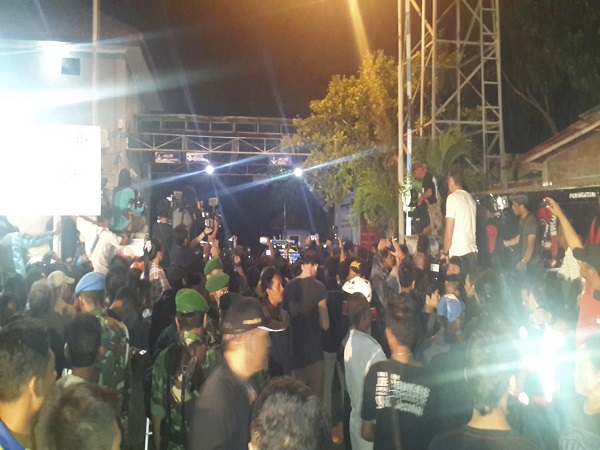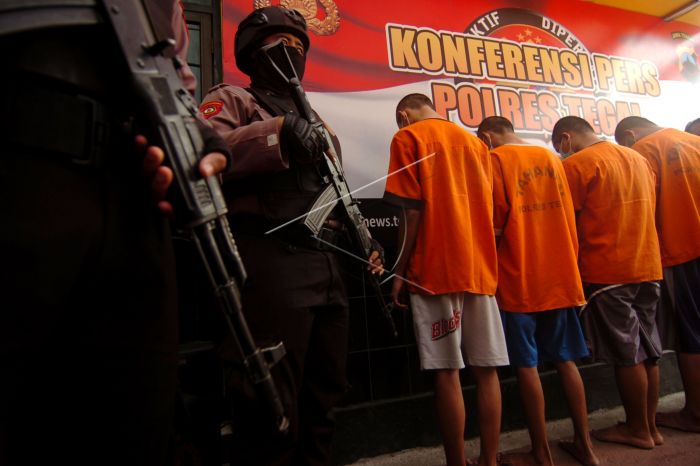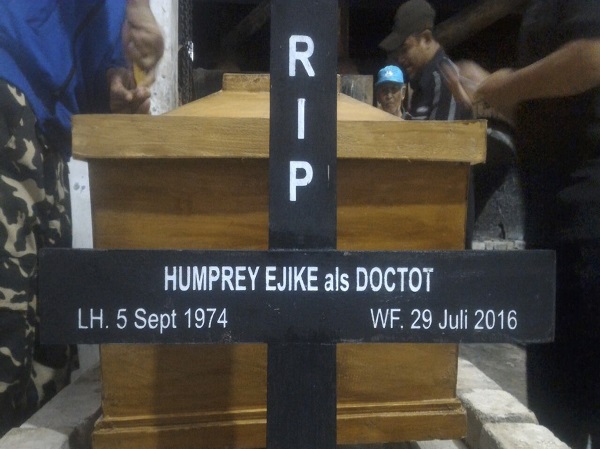Ricky Gunawan & Raynov T. Pamintori
It was 3am on 29 July 2016 and heavy rain was falling in Nusa Kambangan. About 40 of us were waiting anxiously, sheltered inside a rectangular building on the Central Javanese prison island infamously dubbed the ‘Alcatraz of Indonesia’. Seven hours into our excruciating wait, four ambulances pulled up to the building. A man in a brown uniform called my name. He handed me a document to sign. I felt the clock stop ticking when I saw the name on the paper: Humphrey Ejike Jefferson.
Humphrey Ejike Jefferson, or Jeff as we liked to call him, had been one of our clients at the Community Legal Aid Institute (LBH Masyarakat) for the preceding eight years. That night, Jeff was executed by the Indonesian state along with fellow Nigerian Michael Titus Igweh, Indonesian Freddy Budiman and Senegalese Seck Osmane. Jeff was on death row for 13 years, consistently maintaining his innocence in a case that was marred by administrative and legal irregularities. This includes being executed less than 72 hours from his notice of execution, a minimum window period set by law, and despite having a pending clemency decision from President Jokowi. This was illegal under Indonesia’s own 2002 Clemency Law.
No justice for Jeff
Back in 2003, Jeff owned an African restaurant in Tanah Abang, Central Jakarta. One day in August, three police officers arrived at his restaurant and asked to search the premises after receiving a tip-off that Jeff had been dealing drugs from the venue. At that time, Jeff was away providing prayer services for foreign Christian prisoners in Tangerang Prison, roughly two hours west of Jakarta. Over the phone, he gave the police permission to search the restaurant. They refused, insisting that the search be conducted in Jeff’s presence. Jeff voluntarily returned to his restaurant and cooperated with the police search, which did not retrieve any evidence of drugs. A phone call was made by one of the officers. The police then entered an unused bedroom attached to the restaurant, searched the bed and found five socks stuffed with a total of 1.7 kilograms of heroin. They accused Jeff, saying that the heroin belonged to him. When he denied the allegation, he was beaten and forcibly taken to the police station, where he endured hours of severe torture, while his hands were tied and eyes blindfolded. To stop the pain and suffering, he confessed.
Jeff was subsequently charged with drug trafficking and tried before the Central Jakarta District Court. In April 2004, he was sentenced to death despite his repeated claims of innocence, lack of evidence and witnesses, substandard interpreter provided by the court, and lack of legal defence. In one consideration, the court stated that due to the large amount of drugs found, it must be a case of trafficking because ‘black-skinned Nigerian people are often monitored by the police for drug trafficking and they tend to operate in Indonesia in a neat and covered manner.’
In October 2004, at Cipinang Prison in East Jakarta Jeff met Kelly, a Nigerian acquaintance who was also incarcerated on drug trafficking charges. Kelly had HIV and was dying. Knowing that Jeff provided religious services to fellow prisoners, Kelly asked to repent too. Kelly confessed that he planted the drugs in Jeff’s bed and bribed the police to arrest him. He asked for Jeff’s forgiveness and sought his blessing. Several prisoners witnessed this event. Jeff’s lawyer at that time submitted their witness statements to the Supreme Court as new evidence for a case review arguing for Jeff’s innocence. In 2007, the Supreme Court rejected Jeff’s case review on the basis that the statements were one-sided.
Not an isolated case
Zulfiqar Ali, a Pakistani national, was listed for execution in the same batch as Jeff. Just a couple of days before his execution, a letter from former president BJ Habibie asking President Jokowi to halt the execution of Zulfiqar on the basis of strong evidence that he was innocent, was leaked to the media. Gurdip Singh, Zulfiqar’s co-defendant, had admitted to setting up Zulfiqar. An inquiry undertaken by the Ministry of Law and Human Rights during the administration of President Susilo Bambang Yudhoyono (SBY), also concluded that Zulfiqar was innocent. He was spared at the last minute along with nine other death row prisoners, but died before he could be released allegedly due to severe injuries that he sustained in police custody.
Even before this, two other cases stand out for their blatant miscarriage of justice. Rodrigo Gularte, a Brazilian national, was sentenced to death in 2005 after he was caught smuggling 6 kilograms of cocaine hidden inside surfboards into Indonesia. He lacked both proper legal defence and adequate interpretation throughout his legal proceedings. Rodrigo was executed in April 2015 despite the fact that he suffered from serious mental illnesses, including paranoid schizophrenia and bipolar disorder.
A poor Filipino woman was reprieved at the last minute. Mary Jane Veloso, who was sentenced to death in 2010 for smuggling 2.6 kilograms of heroin to Indonesia, similarly lacked competent legal defence and adequate interpretation during all stages of the legal proceedings against her. Due to new evidence indicating that she was a victim of human trafficking, then-president of the Philippines Benigno Aquino III successfully lobbied Indonesia’s president to halt her execution. She is still on death row waiting for a final decision on her human trafficking case by a court in the Philippines.
All of these cases share common systemic issues that plague Indonesia’s notoriously corrupt legal system, including case fabrication, torture or ill-treatment, incompetent legal representation, poor interpreters for foreign defendants, lack of plausible evidence for conviction, and the absence of nuance in relation to gender and mental health when adjudicating cases. Officials usually argue that these cases are mere exceptions, maintaining that law enforcement officers who are involved in miscarriages of justice are flawed individuals (oknum), rather than acknowledging that Indonesia’s criminal justice system is flawed. Yet the fact that such cases exist suggests that Indonesia’s legal system is imperfect and thus should not bear the authority to impose the ultimate punishment of death.

A populist tool
In December 2014, President Jokowi declared that he would refuse clemency to all drug offenders on death row. Jokowi positioned this stance as a necessary measure in a sweeping war on drugs to counter Indonesia’s so-called state of ‘drug emergency’. He claimed that 50 people died every day ‘because of drugs’, a figure that was questioned by leading academics. In January 2015, Jokowi ordered an opening round of executions. Two more rounds followed, with eight people executed in April 2015 and another four in July 2016.
Despite its questionable scientific basis, the ‘drug emergency’ trope has featured frequently in all matter of public issues within the Jokowi administration. Since drugs are commonly viewed as the ultimate public enemy in Indonesian society, drug-related issues are frequently exploited as standard populist tools. Politicians in Indonesia often promote the merits of ‘fighting’ drugs with a zero-tolerance approach, including calling for the death penalty against drug traffickers and incarcerating non-violent drug users, without fear of public rebuttal, loss of popularity or need to rely on scientific evidence.
Indonesians have a habit of measuring a leader’s potential success through the first 100 days of an administration. Jokowi’s first 100 days were dubbed ‘a dreadful honeymoon’. He faced unexpected frustration from the public following his selection of ministers, his decision to increase the price of fuel, and his choice of the new head of National Police which led to more strife between the police force and the anti-graft commission, the KPK. Praise he received for being a civilian hero suddenly turned into jibes for being a weak leader who was steered by more influential political powers. Jokowi capitalised on the ‘war on drugs’ populist trope. The narrative of the ‘drug emergency’, combined with rejection over the clemency petitions, initiated the first wave of drug executions.
Policy problems
The application of the death penalty for drug convicts is an integral part of Indonesia’s ‘war on drugs’ chronicle. Several punitive features comprise the Narcotics Law No.35/2009, all of which harshly and disproportionately criminalise the possession, use, and trading of drugs. For example, possession of a small joint of cannabis is punishable with a prison sentence of up to four years. The law also criminalises possession of drugs for medical purposes in the same way it criminalises possession for personal use. The case of Fidelis Arie comes to mind, who was imprisoned for growing cannabis in his home to treat his dying wife who was suffering from syringomyelia, a life-threatening spinal cord disorder.

Indonesia’s narcotics law contains a number of fundamental weaknesses that have seen it cause numerous unintended harms without achieving its intended aims of eliminating illegal drug markets and reducing drug use. For example, the law does not clearly differentiate between those who use drugs and those who don’t but are involved in drug-related activities like dealing. The law criminalises both of these non-violent groups of people and stipulates minimum jail-time for most drug-related offences. While the law affirms that ‘drug addicts’ and ‘victims of drug abuse’ have a right to access a rehabilitation facility rather than being incarcerated, other provisions in the same law hinder access to treatment for people who use drugs. Namely, drug possession – which is a necessary action prior to drug use – is also criminalised. These problems have contributed to Indonesia’s growing prison population. In 2018, prisoners convicted of drug-related offences made up 62.63 per cent of the total population in Indonesian prisons. Incarceration exposes people to multiple harms, including high rates of tuberculosis, HIV and hepatitis C. These harms are exacerbated by Indonesia’s notorious overcrowded prison conditions, and prisoners who use drugs are at even higher risk.
The death penalty is written into Indonesia’s drug law despite zero evidence for deterrence. Retaining the death penalty for drugs benefits drug syndicates because executions tend to increase the price of drugs in the illicit market. The higher the cost of distribution, the higher the price of a commodity. In 2014, 583 individuals linked with major drug syndicates were arrested for drug trafficking. In 2016, three rounds of executions later, there were 1238 drug trafficking cases – an increase of 112 per cent.
A new direction?
Indonesia is taking small steps both to minimise the use of death penalty and consider more humane approaches. The result of the recent presidential election guarantees a second term for President Jokowi. With more stable political support, five years of experience, and the next five years being his final term, Jokowi surely can do more to refrain from the use of executions and to reorient the country’s drug policy. Indonesia has been considerably active in promoting human rights in the international community over the past few years. For instance, in 2018 Indonesia secured a non-permanent seat in the United Nations (UN) Security Council and went on to play a significant role in efforts to resolve the Rohingya refugees crisis. It also continues to promote the notion that Islam and democracy can coexist. Abroad, the government work hard to save Indonesian migrant workers from execution, although, ironically, Indonesia’s domestic courts continue to impose the death penalty at home.
Indonesia has abstained in two recent UN voting sessions on a moratorium on the death penalty. This is a slight improvement considering that it consistently voted against the resolution in past years. Domestically, the Indonesian parliament revised the colonial-era Criminal Code by proposing a 10-year suspension period for people who are sentenced to death, after which the sentence may be commuted to life imprisonment. These developments strongly suggest that Indonesia is slowly moving away from the death penalty.
While Indonesia appears to be prepared to improve its human rights image in the eyes of the international community, it remains a few steps behind other Southeast Asian states on drugs and the death penalty. In December 2018, Thailand became the first Southeast Asian country to legalise the use of cannabis for medical and research purposes. Malaysia has scrapped the mandatory death penalty from its law, while the idea of total abolition has been discussed at a national level.
Decisive action needed
If President Jokowi is genuinely willing to abolish the death penalty in Indonesia, he would champion a concerted and comprehensive action plan for abolition that involves all levels of government and meaningfully engages civil society. Four specific measures would demonstrate his commitment: establishing an independent expert group to review all death penalty cases that are final and binding; commute death row prisoners who are above 65 years old, have spent more than 10 years on death row, or have serious illnesses; instruct the Attorney General to ensure that prosecutors will not seek the death sentence in capital cases; and commission independent studies to assess the deterrence effects of the death penalty in general and for drug offences in particular.
An initial step in this direction at the parliamentary level could be abolishing the death penalty for crimes that are unlikely to happen in Indonesia, such as disclosing information related with atom technology. Additionally, Indonesia would do well to ratify the Second Optional Protocol of the International Covenant on Civil and Political Rights (ICCPR) aiming at the abolition of the death penalty.
Furthermore, the Supreme Court has an opportunity to lead on promoting just trials by developing sentencing guidelines with an emphasis on capital cases, to ensure the highest safeguarding principles in Indonesia’s criminal justice system. This way, incidents of unfair trials could be minimised.
A lingering question, particularly for supporters of the death penalty for drug offences, is how do we deal with the harms associated with drug use without resorting to the ultimate punishment? The solution to this lies in reforming Indonesia’s Narcotics Law such that drug use is reoriented as a public health issue instead of a criminal justice matter.
A shift in investment away from punitive law enforcement and toward evidence-based drug treatment and harm reduction programs like methadone maintenance therapy, needle syringe programs, overdose prevention and psychosocial support would also improve matters. In 2018, civil society organisations found that only 0.3 per cent of the budget allocated for fighting the ‘war on drugs’ was used for health programs.
But perhaps the reform with the greatest potential impact on the wellbeing of Indonesian citizens would be the decriminalisation of drug use and possession. Portugal, one of the first countries to decriminalise the consumption of all drugs, has seen rates of drug use decrease and common drug-associated problems like HIV and hepatitis C nearly disappear.
The irrational drug war, that includes the death penalty for drugs, must stop. President Jokowi has all the necessary means at his disposal to commence this journey. Will he take that historic step?
Ricky Gunawan (rgunawan@lbhmasyarakat.org) is a human rights lawyer, and director of LBH Masyarakat (LBHM), which provides free legal services for the poor and victims of human rights abuses.
Raynov T Pamintori (raynov@reprieve.org.uk) is a Southeast Asia Fellow at Reprieve, which provides legal support for those facing the death penalty.
